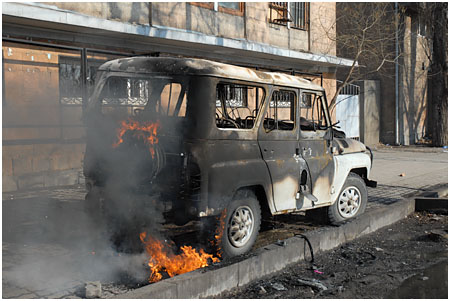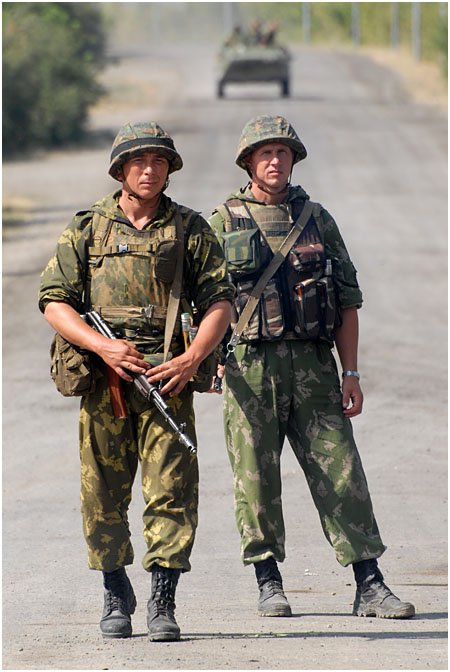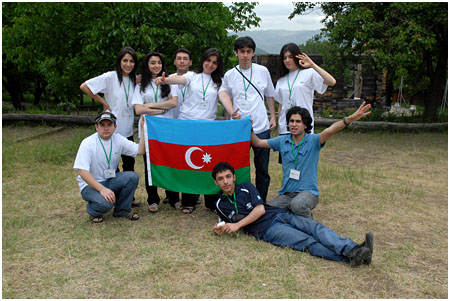Last year ended with a state of emergency declared in Georgia, but few could imagine that the events of 2008 would eclipse those of 2007. Three presidential elections, a war, and yet another state of emergency defined the South Caucasus this year, and bloggers were there to document events from the ground even when the local and international media wasn't.
True, the presidential election held at the beginning of the year in Georgia passed largely without incident, but trouble was already brewing in neighboring Armenia ahead of its vote to determine succession to the incumbent president the following month. Blogging on politics naturally intensified and mirrored the deep divisions in the country.
Signs that the 19 February presidential election in Armenia would end in bloodshed were already becoming evident.
That there would be mass demonstrations immediately after the presidential election held last week in Armenia was known long ago. Many observers also figured on yet another attempt by the radical opposition to stage a colored revolution of the type seen in Georgia and Ukraine. However, few expected it to succeed, but a week after the 19 February vote, the situation is now gearing up for what might be serious confrontation between opposition supporters and the authorities.
[…]
[…] bloggers such as The Armenian Observer still fear that it might all end in violence with a state of emergency being declared in the country.

Levon Ter-Petrossian Rally, Liberty Square, Yerevan, Republic of Armenia © Onnik Krikorian, Licensed under Creative Commons
Less than seven days later, on 1 March, a botched attempt to disperse opposition supporters protesting the outcome of the election forced a showdown that left a reported eight people dead and a state of emergency declared in the country. The number of those who lost their lives in the clashes between opposition and security services eventually rose to at least 10.
On Saturday 1 March, the inevitable came true. At least eight people died in clashes between police, soldiers and opposition supporters. Shops were looted, cars set on fire, molotov cocktails were thrown, and in addition to the fatalities known so far, 16 servicemen and 18 protesters were wounded in shooting between the two sides. Each side blames the other and protests their innocence while the majority of residents in the Armenian capital, Yerevan, resigned themselves to the worst case of election-related violence in the country's short history as an independent state.
[…]
Eventually outnumbered and out gunned, demonstrators never stood a chance against the military, and a state of emergency was declared in the capital. […]

1 March, Yerevan, Republic of Armenia © Onnik Krikorian, Licensed under Creative Commons
With the media forced to comply with draconian censorship introduced as part of the 20-day state of emergency that followed, blogs were remarkably untouched and came of age, although YouTube was blocked by the authorities. Citizen journalism moved in to fill the gap, albeit in sometimes mutually hostile ways between the two camps, and became the new samizdat.
Samizdat (Russian: самиздат) was the clandestine copying and distribution of government-suppressed literature or other media in Soviet-bloc countries. Copies were made a few at a time, and those who received a copy would be expected to make more copies. This was often done by handwriting or typing.
This grassroots practice to evade officially imposed censorship was fraught with danger as harsh punishments were meted out to people caught possessing or copying censored materials.
Vladimir Bukovsky defined it as follows: “I myself create it, edit it, censor it, publish it, distribute it, and [may] get imprisoned for it.”
But even though opposition protests continued after the state of emergency was lifted, attendances were small. The inauguration of the new president, Serge Sargsyan, was held under tight security while relatives of those protesters killed on 1 March mourned their loss 40 days later on 9 April. Besides, Armenia, along with its two neighbors, Azerbaijan and Georgia, was already preoccupied with the Eurovision Song Contest.
Moreover, the authorities in Yerevan were fast becoming aware of the power of new media and were soon to allow pro-government bloggers into press conferences.
[…] not all bloggers welcomed the news and there was also much criticism in the Armenian blogosphere. Pro-opposition blogger Nazarian, for example, remarked that “The invited were palace bloggers serving the needs of the regime. The questions they asked obviously were pro-regime..” Unzipped went further, wondering if “the real intention behind recent close engagements of presidential staff with few pro-government bloggers is to discredit blogs/blogging in the eyes of population, in general, from the beginning, without even allowing their further development.”
But if events in Armenia set shock waves through the international community regarding the state of democracy and stability in the South Caucasus, what happened towards the end of the summer put the region, and Georgia in particular, on the front pages of every newspaper in the world. Although bloggers had speculated in May that war with Russia might break out over the breakaway region of Abkhazia, few expected fighting to occur in another disputed territory at the beginning of August.
With local and international media outlets reporting that fighting is spilling over into Georgia proper, the latest military confrontation with Russia over the breakaway region of South Ossetia looks increasingly like war. Wu Wei reports from Tbilisi that the Vaziani military base just outside the Georgian capital has been bombed. The signs look very ominous indeed.
After the failed attempt by Georgia to retake South Ossetia by force, Russia invaded and the blogosphere soon provided the most diverse views and opinions on the conflict between Moscow and its former satellite. The New York Times reproduced posts from Global Voices Online on its own blog and, including voices from Georgia, South Ossetia and Russia as well as elsewhere, syndicated our extensive special coverage of the war.
On August 8, 2008 while the 2008 Beijing Olympics were officially being inaugurated, fighting intensified between the Georgian and Russian military on the outskirts of Tskhinvali, the capital of the breakaway region of South Ossetia. Earlier in the week, Georgia and the South Ossetian separatist government had concluded a truce after an outbreak of fighting for which each side blamed the other. The conflict has now escalated into war, with Russian forces bombing Georgia, and many dead.

Russian Roadblock, Gori, Republic of Georgia © Onnik Krikorian, Licensed under Creative Commons
Accompanied by Russian cyber-attacks on government and media web sites as well as on its telecommunications system, if the presidential election in Armenia earlier in the year marked the turning point for blogs there, the war over South Ossetia saw them come of age in Georgia. Even specialist publications such as The Institute for War and Peace Reporting (IWPR) began to harness their potential in order to fully cover the conflict.
Indeed, with attacks on freedom of the press in all three countries on the increase, and especially in Armenia and Azerbaijan, blogging increased in the region in 2008, although the October presidential election in the latter was noticeably quiet and subdued in comparison, and especially considering its potential.
Global Voices: Yesterday you told me that blogging is quite well established in Azerbaijan.
Emin Huseynzade: There are different groups of bloggers in Azerbaijan and they started mainly on Blogspot and Blog.com before Russian blogs appeared on LiveJournal. Then some started to appear on blog.az, but there were a few problems with that. However, Azeriblog.com created a new blogging system a few years ago. Actually, the system was created by a blogger from what some call South Azerbaijan in Iran. In fact, many of those using that system were from there. On that system alone there are nearly 5,000 bloggers out of a total of some 8,000 spread across different platforms.

Azerbaijani participants, Caucasus BarCamp, Tbilisi, Republic of Georgia © Onnik Krikorian, Licensed under Creative Commons
Regardless, if some of the most under-reported issues and topics were being discussed in the past on blogs by Peace Corps Volunteers in Armenia, Azerbaijan and Georgia, political blogging nonetheless intensified and was also accompanied by specialist blogs from activists and professionals denied a voice in the mainstream local media.
This was especially true for Education specialist blogs and those from the LGBT community in Armenia and its Diaspora.
[…] the number of LGBT blogs from Armenia and the Diaspora has mushroomed. In part, this is probably because of the important precedent set by Unzipped: Gay Armenia. The blogger from Armenia now resident in England truly did cover sensitive issues such as gender, homosexuality and homophobia in what still remains a largely male-dominated patriarchal society with little regard for sexual minorities or women's rights.
Admittedly, with events in the region this year taking many by surprise, it is hard to say what will happen in 2009, but with momentum reported in talks to normalize relations between Armenia and Turkey following a historic visit by Turkish President Abdullah Gul to Yerevan in September, as well as moves to resolve the conflict over Nagorno Karabakh including peace-building initiatives going online, it could be another very interesting year indeed.
Until then, Happy Holidays from the Caucasus section of Global Voices Online. Here's hoping that whatever does happen in 2009 will be accompanied by little or preferably no bloodshed.







7 comments
This was quite a year! Thanks for reminding it, Onnik!
Artur, I don’t think you forgot it…
Quite a year indeed, though, but mostly quite negative, I suppose.
:-(
Here’s hoping the events of 2009 will be as many, but far happier.
Onnik, one thing everybody in Armenia agrees on–you took the photo of the year (above)!
Thanks, guys, for the reporting. It certainly couldn’t have been easy.
Informative roundup, Onnik, thank you.
Onnik jan
You’ve done great job this year!
Happy New Year and all the best!!!